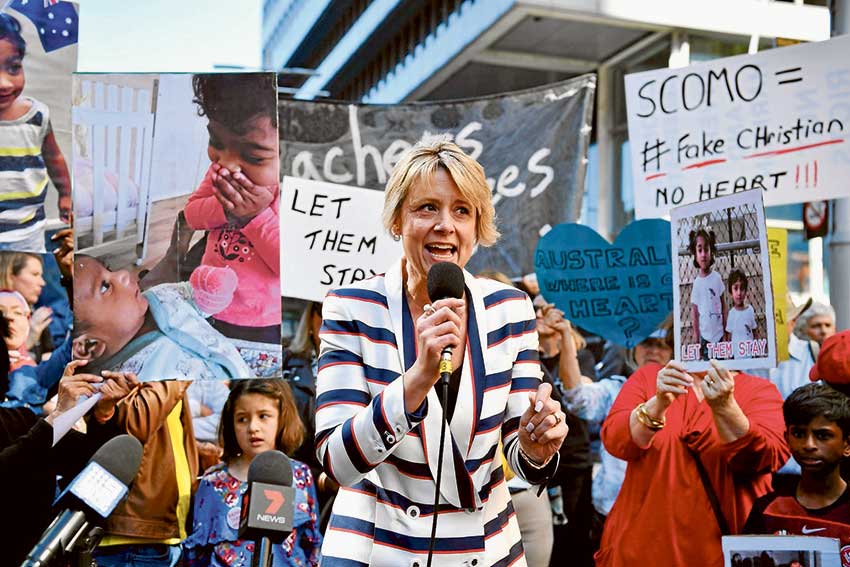
Kristina Keneally’s argument that Prime Minister Scott Morrison should “show what Christian leadership looks like” by allowing the Sri Lankan Tamil family to stay in Australia and not be deported as illegal immigrants highlights how irrational and illogical the cultural-left can be.
In her role as the ALP opposition spokesman on home affairs Keneally, after admitting she too is a Christian, argues Scott Morrison “should look into his heart and decide what the generous Christian response is”.
The ALP frontbencher Joel Fitzgibbon makes the same mistake when he also argues the Prime Minister’s refusal to allow the illegal refugees to stay betrays his Christian beliefs. Fitzgibbon is reported as describing Morrison’s actions as “hypocritical” and “not a Christian approach”.
Contradictions?
The contradiction is that Keneally and Fitzgibbon are both senior members of a centre-left party that consistently argues there is no place for religion, especially Christianity, when deciding government policy.
As noted by the Tasmanian Liberal Senator Eric Abetz “The Left, who often say we shouldn’t bring religious values to public policy, now say it has to be”. The obvious point is that you cannot have it both ways; either religious beliefs are allowed or they are not.
When dealing with controversial issues such as same-sex marriage, abortion and euthanasia the Australian Labor Party, as does the cultural-left in general, argues there is no room for religious faith or beliefs and such contentious matters must be decided solely on a secular basis.
Using others’ faith as a blunt instrument
According to this argument religion is a private matter that has no place in the public square. Jesus’ statement “render unto Caesar what is Caesar’s and render unto God what is God’s” is taken literally with Christian politicians told they must ignore their faith when considering government policy.
The ALP’s refusal to allow religious convictions to influence decision making explains the personal and vitriolic attacks on conservatives like Tony Abbott and Kevin Andrews for supposedly allowing their Christian beliefs to influence their stance on abortion and euthanasia.
Arguing on one hand that Prime Minister Scott Morrison must decide government policy based on his Christian beliefs and on the other hand arguing there is no place for religious faith in politics is a classic example of ‘cognitive dissonance’.
Cognitive dissonance and ‘Doublethink’
Cognitive dissonance refers to the ability to hold two or more contradictory thoughts or beliefs at the one time and not realise they are in opposition. The author of 1984, George Orwell, describes this as “Doublethink” – defined as the “power of holding two contradictory beliefs in one’s mind simultaneously and accepting both of them”.
In arguing the Prime Minister’s refusal to allow the Tamil family to stay in Australia fails the Christianity test Kristina Keneally and Joel Fitzgibbon are also open to the criticism that their interpretation of the Bible might not be as clear as they think.
While it’s true the Bible teaches all must be treated with love, compassion and justice it’s also true there are often complex and difficult decisions that do not lend themselves to a simple or straightforward solution.
If one act of compassion rewards illegal actions and leads to suffering and injury to others then the reality is that the right decision is not always the one that appears most obvious. Keneally and Fitzgibbon in using the Christian card to attack Scott Morrison are also open to the criticism they are using religion to score cheap political points.
“If one act of compassion rewards illegal actions and leads to suffering and injury to others then the reality is that the right decision is not always the one that appears most obvious.”
Introducing Christianity into the debate about whether or not the Tamil family should be allowed to stay in Australia might grab a headline or a 30 second sound grab on the daily news but it ignores the fact that the PM’s decision in all likelihood is motivated not by religion but by what is the most effective way to stop the boats.
During the Rudd/Gillard years of government thousands of illegal refugees sought to travel in leaky boats to Australia and hundreds drowned and were lost at sea. Beginning when John Howard was Prime Minister Liberal/National governments have stemmed the tide by adopting what appear to be harsh and unforgiving polices. Hence, the refusal to grant the Tamil family permission to stay.
History would indicate otherwise …
Postscript. Proven by the example of Sir Thomas More who refused to endorse King Henry’s marriage annulment and the German Christian theologian Dietrich Bonhoeffer who was executed as a result of opposing Nazism it’s obvious that political acts can be deeply imbued with religious conviction and faith. To suggest otherwise is to deny that for many involved in the public domain Christianity is the wellspring that determines their moral character and how they think and how they act.
Related
- Religious freedom: Can the PM stay true to his word?
- Podcast: This Catholic Life – Religious Freedom
Dr Kevin Donnelly is a Senior Research Fellow at the Australian Catholic University and author of How Political Correctness Is Destroying Australia.
